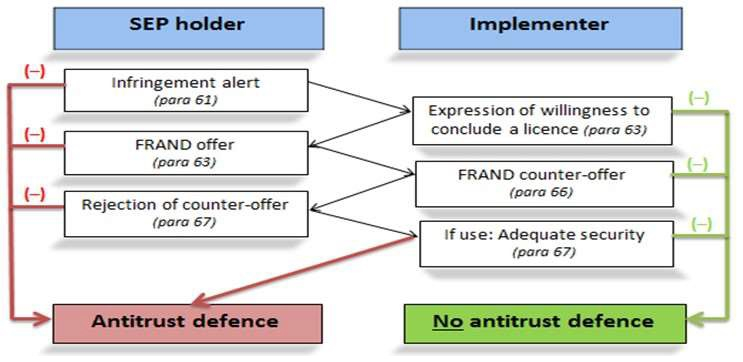Docket no. 6 U 3824/22
In its final judgment dated March 20, 2025, the Higher Regional Court of Munich commented for the first time on the FRAND objection in a decision in principal proceedings. The Higher Regional Court of Munich rejects the strictly sequential examination of the obligations of the SEP holder and the user defined by the ECJ ("Huawei v. ZTE", C-170/13), as advocated by, inter alia, the European Commission as amicus curiae, but opens up the possibility for the user to have the content of the SEP holder's license offer checked for its FRAND compliance by providing a security.
1. Facts of the case
The decision was based on the following facts and circumstances:
The Plaintiff VoiceAge asserts infringement of the German part of the European Patent 2 102 619, which is allegedly essential for the EVS standard, against the Defendant HMD. The attacked embodiments are 3G and 4G enabled mobile devices of the Defendant that implement the EVS standard. In its statement of complaint dated October 11, 2019, the Plaintiff initially only asserted claims for provision of information, rendering of accounts, and determination of the obligation to pay damages. The Plaintiff later extended the claim to injunctive relief, recall and destruction.
At first instance, the Regional Court of Munich I found for the Plaintiff, essentially as requested, in its final judgment dated May 25, 2022 (docket no. 7 O 14091/19). In addition to finding that the patent-in-suit was infringed in a version that was defended to a limited extent before the German Federal Patent Court, the Regional Court of Munich I also rejected the Defendant's defense of compulsory license under antitrust law (FRAND objection). The Defendant's appeal is directed against this judgment.
In the parallel nullity proceedings, the German Federal Patent Court maintained the patent-in-suit in the limited version found to be infringed in the infringement proceedings by judgment dated September 16, 2022 (docket no. 4 Ni 12/21 (EP)). This judgment became final and absolute.
The appeal proceedings have attracted particular attention in view of the Defendant's FRAND objection. After all, it was the first principal proceedings in which the Higher Regional Court of Munich had to rule on a FRAND objection. In addition, the European Commission commented on the FRAND objection in these proceedings as amicus curiae both in writing in a submission dated April 15, 2024, and orally at the hearing on October 31, 2024, and explained its understanding of the ECJ decision "Huawei v. ZTE" (C-170/13). The European Commission adopted a strictly sequential examination of the obligations of the parties as defined by the ECJ, which the European Commission illustrated graphically as follows:

Image source: Comment of the European Commission dated April 15, 2024, Higher Regional Court of Munich, 6 U 3824/22, marginal no. 55
In the European Commission's view, this examination sequence is mandatory. According to the European Commission, all obligations must further be fulfilled before a complaint for injunctive relief is filed; subsequent rectification is not permitted.
2. Decision of the Higher Regional Court of Munich
The Higher Regional Court of Munich confirmed both the finding of patent infringement and the rejection of the FRAND objection by the Regional Court of Munich I, and consequently dismissed the Defendant's appeal.
It is a clear message of the Higher Regional Court of Munich that the negotiation steps set out in the ECJ decision "Huawei v. ZTE" do not impose a rigid sequence of procedural steps on the parties, which the court must examine strictly one after the other. The European Commission's opposing view is clearly rejected by the Higher Regional Court of Munich. In the Higher Regional Court's view, the European Commission itself cannot consistently adhere to the concept illustrated in the above diagram, for example if the European Commission demanded a counter-offer from the user even if the SEP holder made a license offer that was contrary to FRAND terms.
The Higher Regional Court of Munich further repeatedly emphasizes that failures by one party in a procedural step can be remedied by starting license negotiations afterwards. If, for example, the patent proprietor's infringement notice was not sufficient or if the user of the patent did not declare their willingness to conclude a license immediately after such a notice, these procedural deficiencies can no longer be asserted if the parties have subsequently commenced license negotiations.
Finally, a third, equally very important aspect of the decision concerns the security that the patent user has to provide if the patent proprietor has rejected its counter-offer. The Higher Regional Court of Munich clarified the previously unanswered question of whether the security must be based on the patent proprietor's request or on the user's counter-offer by deciding that it is the patent proprietor's offer that is decisive. The security must therefore cover the license fees (most recently) demanded by the SEP holder, and secure it in the event that the defendant's FRAND objection is not successful.
The findings of the Higher Regional Court of Munich regarding the individual obligations of the parties can be summarized as follows:
In the Court's view, the notification of infringement can in any case be seen in the filing of the complaint for damages and information / rendering of accounts, as the Plaintiff had done in the present case. Irrespective of this, the Defendant can no longer successfully object to the Plaintiff's lack of or deficient notification of infringement. According to the Higher Regional Court of Munich, if the user enters into actual license negotiations with the SEP holder, the purpose of the infringement notification is regularly fulfilled. It would be contrary to good faith if the user were to invoke purely formal errors in the notification of infringement, which was made at the beginning of the negotiations, at a late stage in the court proceedings. However, the Higher Regional Court of Munich deems individual exceptions to be conceivable.
With regard to the user's expression of willingness to conclude a license, the Higher Regional Court of Munich applies similar criteria as to the notice of infringement. According to the reasoning of the Higher Regional Court, the SEP holder can no longer invoke a user's missing declaration of willingness to conclude a license at a late stage of negotiations if the SEP holder has submitted a license offer despite a missing or defective declaration of willingness to conclude a license and the parties have subsequently entered into negotiations. Therefore, the FRAND objection was to be rejected due to the Defendant's lack of an expression of willingness to conclude a license.
Regarding the FRAND license offer of the SEP holder, the Higher Regional Court of Munich finds that the FRAND objection cannot succeed in any case if the offer is actually FRAND-compliant. This is because the SEP holder is then not legally obliged to abandon this offer, regardless of how the user reacts to it.
However, if the SEP holder's license offer is not FRAND, the FRAND objection may still be unsuccessful in the opinion of the Higher Regional Court of Munich—depending on the user's further conduct. The Court argued that the reason for this is that the user must submit a counter-offer and provide security even when the offer is contrary to FRAND terms, as otherwise there is no need for negotiations or a counter-offer. According to the Higher Regional Court of Munich, the counter-offer / its submission and the provision of security by the user must first be taken into account before the patent proprietor's offer is examined in detail on its FRAND compliance.
With regard to the user's counter-offer, it is in the Higher Regional Court of Munich's view only necessary to examine whether such a counter-offer was submitted. Whether the counter-offer complied with FRAND terms is irrelevant. The Court argued that the FRAND compliance of the counter-offer is ultimately irrelevant in all constellations:
- If the SEP holder's license offer was FRAND, the FRAND objection does not succeed regardless of the counter-offer.
- If the user has submitted a counter-offer and provided security and the SEP holder's license offer then turns out to be contrary to FRAND, the FRAND objection is successful regardless of the content of the counter-offer.
However, the Higher Regional Court of Munich emphasized that the counter-offer of the patent user nevertheless fulfills an important function. On the one hand, it gives the user the opportunity to raise concerns about the patent proprietor's offer and suggest solutions. This gives the patent proprietor the opportunity to adapt its offer in view of the patent user's objections. On the other hand, the counter-offer is an important part of the negotiation process for the court and thus an amicable solution, which should always be the primary goal of the parties.
The security to be provided by the user must, in the opinion of the Higher Regional Court of Munich, be based on the SEP holder's last offer (and not the user's counter-offer). After all, this offer alone is ultimately decisive for the question of abuse by a plaintiff in litigation for injunctive relief. If the SEP holder's last offer includes a worldwide portfolio license, the security must relate to this. According to the Higher Regional Court of Munich, another point is that the user must make a binding declaration that the SEP holder will receive the security if the offer proves to be FRAND-compliant and the patent infringement is confirmed in a legally binding manner. If the user provides security in accordance with the requirements of the Higher Regional Court of Munich, the SEP holder's offer must be examined to determine whether it is FRAND-compliant. If, on the other hand, sufficient security is not provided, the Higher Regional Court argues that the FRAND objection is to be rejected without the SEP holder's offer having to be examined for its FRAND compliance.
The latter was the case in this instance. The Defendant had only provided security in the amount of its own counter-offer and had not made a binding declaration to accept the Plaintiff's final offer if it was FRAND. As a result, the Higher Regional Court of Munich rejected the FRAND objection.
It allowed an appeal to the German Federal Court of Justice with regard to the FRAND objection.
3. Comments
The reasons given by the Higher Regional Court of Munich for rejecting the FRAND objection are important because it is the first decision in principal proceedings of the Higher Regional Court of Munich on FRAND objections, which is likely to shape the case law of the Regional Court of Munich I—currently the most important court of jurisdiction for SEP infringement cases in Germany—in the coming years. The case law of the Regional Court of Munich I has been the subject of repeated criticism in recent years, which may have been one reason for the Commission's amicus curiae intervention in these proceedings. It was not least due to the amicus curiae intervention of the European Commission that this judgment of the Higher Regional Court of Munich had been eagerly awaited.
In its decision, the Higher Regional Court of Munich does in fact deviate from the examination order previously applied by the Regional Court of Munich I, but at the same time also clearly rejects the Commission's view. The Commission's view that the ECJ prescribes a strictly sequential order of examination has already been rejected by the German Federal Court of Justice in the decisions FRAND-Einwand (GRUR 2020, 961) and FRAND-Einwand II (GRUR 2021, 585).
There are, however, some differences between the approach of the Higher Regional Court of Munich and that of the German Federal Court of Justice. The German Federal Court of Justice has put a strong focus of the examination on the user's willingness to conclude a license and, under this keyword, carried out an overall consideration of the user's conduct in the license negotiations. The Higher Regional Court of Munich, on the other hand, is quite quick to ignore the examination of the user's declaration of willingness to conclude a license and instead focuses its examination on the provision of security by the user. This approach can be brought into line with the case law of the German Federal Court of Justice if the Higher Regional Court of Munich considers a user who provides security in accordance with the requirements of the Higher Regional Court of Munich to be willing to conclude a license, irrespective of their previous conduct.
The approach of the Higher Regional Court of Munich has three characteristic aspects:
- The content of the notice of infringement and the declaration of willingness to conclude a license do not have to be reviewed in detail if license negotiations actually ensue. Entering into license negotiations can remedy omissions in these procedural steps so that they no longer need to be examined in the context of the judicial FRAND objection.
- The content of the SEP holder's license offer only needs to be examined if the user submits a counter-offer, provides security, and makes a binding declaration to accept the SEP holder's license offer if it proves to be FRAND and the patent infringement is confirmed in a legally binding manner.
- If the user meets all the requirements for the examination of the SEP holder's last license offer, the FRAND objection stands or falls with this offer. If it is FRAND, the user has to accept it. If it is not FRAND, the request for injunctive relief is rejected. The user's counter-offer is ultimately never decisive.
Both patent holders and users of SEPs should be pleased with the Commission's clear rejection of the formalistic approach. This increasingly shifts the focus to a substantial examination of the parties' conduct and the offers exchanged, which serves the goal of a comprehensive balance of interests that underlies the FRAND objection.
However, according to the case law of the Higher Regional Court, a prerequisite for the FRAND objection is the provision of a security by the defendant in the amount of the SEP holder's last offer. Only if such security has been provided will the patent proprietor's license offer be subjected to a material FRAND examination. The Court did not have to carry out this examination in the case decided, but it becomes clear that there is a certain range of conditions that can be regarded as FRAND. The patent proprietor can make use of this range without, according to the judgment of the Higher Regional Court of Munich, the patent user's counter-offer being crucial.
For patent users, this abandonment of the strict requirements that the Higher Regional Court of Munich placed on the defendant's willingness to conclude a license is probably a positive development. The aspect of the patent user's willingness to conclude a license, which played a central role in the FRAND-Einwand I and FRAND-Einwand II decisions of the German Federal Court of Justice as well as in the case law of the courts of lower instance and not least in the first judgments of the UPC on the FRAND objection, takes up very little space in the considerations of the Higher Regional Court of Munich. However, this should not lead to the premature conclusion that this aspect will no longer play a role in the future. In the judgment of the Higher Regional Court of Munich, the Defendant's willingness to conclude a license was not decisive because the FRAND objection was cut off anyway due to the failure to provide security. If such security is provided and the court accordingly carries out a material examination of the patent proprietor's license offer, then the patent user's willingness to conclude a license will also have to be taken into consideration (again).
The judgment of the Higher Regional Court of Munich will be of seminal importance for German FRAND case law in the coming years, at least until the German Federal Court of Justice renders another decision.
It remains to be seen to what extent the UPC will follow the decision of the Higher Regional Court of Munich. In any case, the judgment of the Higher Regional Court of Munich has certain similarities to the decision of the Local Division Munich dated December 19, 2024, UPC_CFI_9/2023 (Huawei vs. Netgear) with regard to the provision of security. The Local Division Munich also takes the view that, in the absence of a security provision, the FRAND compliance of the SEP holder's offer is not examined. In addition, the Local Division Munich likewise requires a binding declaration that the SEP holder will receive the security as a license payment if its offer ultimately proves to be FRAND-compliant and the patent infringement asserted with the complaint for injunctive relief is also confirmed in a legally binding manner, and refers to the indicative court order of the Higher Regional Court of Munich dated October 30, 2024. The decision of the Higher Regional Court of Munich should therefore also be of great interest to the UPC and be taken into account in future decisions.
The content of this article is intended to provide a general guide to the subject matter. Specialist advice should be sought about your specific circumstances.




